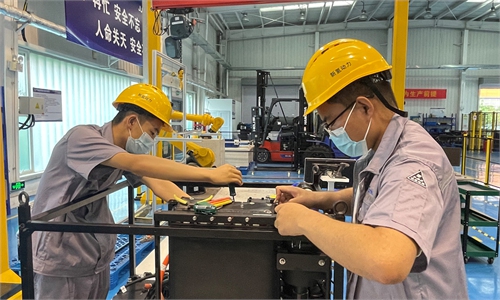China's hydrogen energy sector enters fast lane: official
More efforts called for to make breakthroughs in key materials and core technologies

Aerial photo of a comprehensive hydrogen energy utilization demonstration project on Dachen Island, Taizhou, East China's Zhejiang Province Photo:VCG
China's hydrogen energy sector has entered the fast lane of development, an official said, as the country steadily pushes ahead with its green drive.
China has witnessed an increasingly mature hydrogen energy sector, with supportive policies, robust market demand, and emerging new technologies, Shen Zhulin with the National Development and Reform Commission (NDRC), China's top economic planner, said at the 2022 China Hydrogen Industry Conference.
As the world's largest hydrogen producer, China has an annual hydrogen energy output of about 33 million tons and over 300 hydrogen enterprises that have an annual main business revenue of at least 20 million yuan ($2.84 million).
In a plan on the sector's development for the 2021-2035 period released in March, the country defined hydrogen energy as a significant part of its future energy mix and aims to achieve its green and low-carbon transformation with a vibrant hydrogen energy industry.
The sector will help China's race to achieve its carbon peaking and neutrality goals, analysts said. With the clean energy, industries from transportation to the petrochemical sector will be able to accelerate the green shift.
At the conference, 17 major hydrogen projects covering areas from power generation to smart energy systems were initiated, put into operation or saw agreements signed.
However, China's hydrogen energy industry is still in its infancy, facing multiple problems such as weak innovation capabilities, a low level of technical equipment, and insufficient basic support for industrial development.
Xiang Haiping, chief engineer of the National Energy Administration, called for more efforts to make breakthroughs in key materials and core technologies, encourage commercial model innovation and improve the regulatory system, so as to build a healthy ecosystem for hydrogen energy innovation and development.
With a rich source and low carbon emission, hydrogen energy has always been seen as an important carrier for transportation, industry and other energy-using terminals to realize decarbonization. It is also widely regarded as a strategic emerging industry and a key development direction for the future.
Relatively speaking, hydrogen power application in industrial vehicles is not a topic that has often been raised in the Chinese industry in the past.
However, data shows that there is a huge market for industrial vehicles in China, both in terms of stock and potential. In the past two years, the new scale of forklift market in China alone will reach 200 to 300 billion yuan. In addition, the number of forklifts per 10,000 people in China is less than half of that in developed countries, so there is huge room for growth in later stages.
Hydrogen energy power has its unique advantages. One of the most obvious is that it only takes 2-3 minutes to refill a hydrogen fuel cell forklift, while a battery forklift takes at least an hour to recharge and has to be filled with water and replaced.
NDRC said earlier in November that it will promote construction of large wind power and hydropower bases, ramp up renewable energy consumption and increase support for foreign investment in advanced and new technologies.
In 2021, the proportion of clean energy consumption in China reached 25.5 percent, up from 14.5 percent in 2012. The share of coal consumption dropped to 56 percent, down 12.5 percentage points from 2012, official data showed.
Xinhua-Global Times

